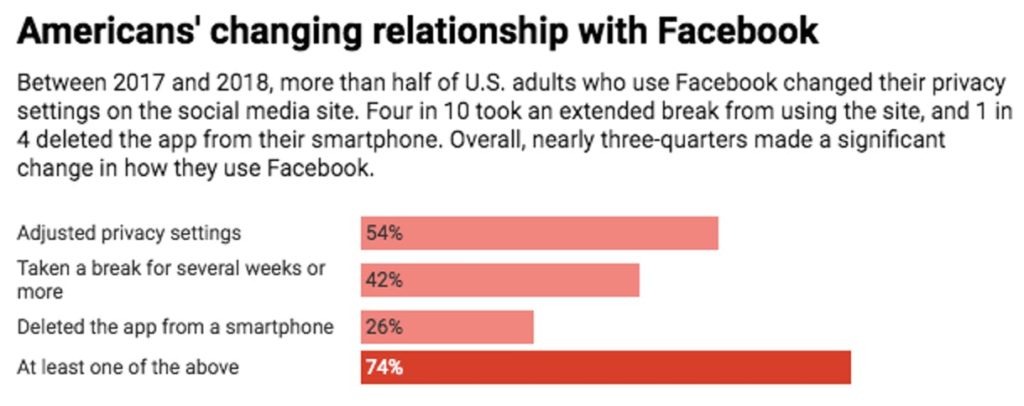Sometimes success is about that sudden moment of insight. The brilliant idea you wake up with in the middle of the night. The vision that comes in a flash.
More often, though, success is about persistence.
Read More »Sometimes success is about that sudden moment of insight. The brilliant idea you wake up with in the middle of the night. The vision that comes in a flash.
More often, though, success is about persistence.
Read More »Friction gets a bad wrap in the business world.
We seek to reduce friction in our funnels, and minimize friction in our interactions with teammates.
But when you’re building something new, sometimes embracing friction is key.
Read More »The Great Facebook Decline is bad, and it’s only going to get worse.

According to Inverse, 74% of American Facebook users have taken at least one step to curtail their Facebook usage.
While privacy breaches and ethics violations are certainly contributors, there’s a hidden root cause of Facebook’s anemic user engagement lurking beneath the surface.
Read More »The WordPress team released a new editor called Gutenberg in version 5.0. It’s a fantastic step forward for WordPress, which sorely needed a new text editor.
Already Gutenberg has saved me countless hours where I no longer have to wrestle with unnecessary markup or strangely-persistent formatting issues.
Read More »I don’t think it’s overstating things to say that tech has an ethics problem.
The factories that produce the devices we use have inhumane conditions. Facebook’s moderators have PTSD, and the company doesn’t seem to care. The self-driving car industry is cutting corners left and right.
Read More »Not everybody can or should become a manager.
I talk to too many professionals who feel like becoming a manager is the inevitable next step in their career.
They dread this because they’d much rather be coding, designing, or doing whatever it is they already do.
My answer to them: keep doing that.
Managing people isn’t the only way to earn more. Titles aren’t the only path to more influence.
Unless you really, truly want the responsibility of mentoring others, providing ongoing, candid feedback, and helping the people who report to you succeed, you shouldn’t manage.
If that doesn’t describe you, there’s nothing wrong with that.
Most bombshell reports lead to nothing happening in the real world. Some little-known stories lead to huge change.
It’s becoming increasingly hard to interpret what actually matters in the average news cycle. When everything is a big deal, nothing is a big deal.
When politicians lie overtly in prominent media outlets and get away with it, people lose trust in reporting. The media is deprecating itself, and nobody seems to know what to do about it.
The obvious solution is better, more in-depth reporting. But that doesn’t sell, and it sure as hell won’t outperform sensationalism. We need something better.
Scott Belsky, co-founder of Behance and author of the Messy Middle, did a fantastic interview on 20VC the other day.
The whole thing is a great listen, but one of my favorite insights is how Scott values initiative over experience, particularly in the startup world.
Startups are inherently turbulent. Your idea about the market need might be wrong. Your strategy for reaching customers may not work. That killer operations tactic you used at your last stop may be outdated. What you don’t know almost always outweighs what you do.
This level of uncertainty means that, no matter how experienced you might be, you almost always have to invent new tactics to solve problems. What matters most in these situations is your ability to roll up your sleeves and get shit done.
Most startup leaders I know pay lip service to transparency.
“We tell our employees everything we reasonably can,” is an all too common refrain. Implicit in this sentiment is the idea that employees just couldn’t handle the full truth. If they knew about the VP of Product’s concerns about product-market fit, the CEO’s worries about running out of cash, or the Director of Marketing’s disagreement with the CTO, they’d be searching for another job immediately. After all, “we need to keep morale up.”
But I’ve never once seen a team that’s unaware of the cash flow problems, the market misalignment, or the healthy (and sometimes unhealthy) disagreements on the leadership team.
They may not say anything, but the team always knows. And little by little, as management pretends these issues don’t exist, the rank and file team members that actually make, market, and sell the product lose faith in the CEO and the leadership team.
The folks at VentureFizz did a great interview with Andy Cook, CEO of Tettra on some of the benefits of more transparency. Check it out.
The real problem with scope creep isn’t missed timelines.
It’s not that it takes too long, or costs too much, though these may be true. The real problem with scope creep is that you lose sight of why you were doing something in the first place.
An engineer adds a feature here, a designer makes some UX improvements there, a marketer requests a “simple” change, and suddenly your MVP has turned into something else entirely. Yes, the functionality is all there, but the analytics are incomplete, the test is muddied, and your team hasn’t validated or invalidated its hypothesis.
Product teams need to be careful to keep their eyes on the prize.
At Hipmatic, we solve this by doing a daily Product Standup. Unlike your typical engineering standup, our product standup focuses less on tickets and blockers and more on the big-picture strategy. Are the things we’re working on still moving us closer to our goals? What’s the best next action we can take to move us forward.
Sometimes these meetings take 5 minutes, and they assure everyone on the time that we’re doing the right things. Sometimes they take 45 minutes, but we course correct before wasting weeks on something we didn’t really need to do.